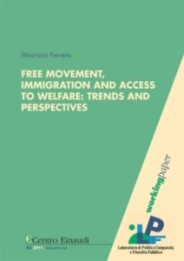- Ricerche e Progetti
- Biblioteca della Libertà
- Pubblicazioni e Working Paper
- Articoli e media
- Eventi e notizie
2011
Free Movement, Immigration and Access to Welfare: Trends and Perspectives
WP-LPF 3/11
- Categoria/Category
- LPF
- Autore/Author
- Maurizio Ferrera
- Articolo completo/Full text
- wp_lpf_3_2011_ferrera.pdf
Abstract
The encounter between territorially closed nation-based welfare states and European integration has generated a new “spatial politics”, defined by novel objects of contention (spatial positionings and movements) and new modes of contention (voice for/against entries or exits). Since the 1970s, the EU has undertaken a slow but incisive process of “space-building” in the social sphere, aimed at creating a community of equals in terms of access to welfare benefits. The paper reconstructs this development, first as regards EU nationals and then Third Country nationals. In the former case, the territorial boundaries of national welfare states have been almost entirely removed and membership boundaries greatly weakened.
In the case of third country nationals, space-building on the side of the EU has made less progress, but some significant bounding prerogatives have been subtracted from the member states, especially in case of long term residence (itself subject to harmonised EU rules). The paper argues that the post-Lisbon status quo has created an unstable institutional equilibrium, characterised by a high potential of political destabilization at the national level.







